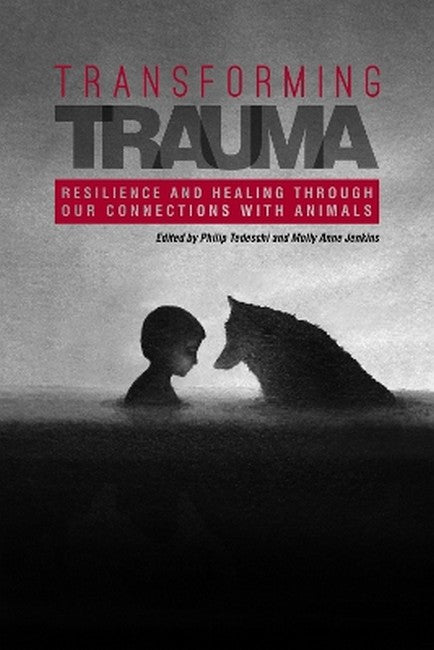Philip Tedeschi is the executive director of the Institute for Human-Animal Connection at the University of Denver's Graduate School of Social Work. Recognized for his expertise in clinical methods for animal-assisted interventions, he is the founder and coordinator of the university's Animal-Assisted Social Work and Animals and Human Health Professional Development certificate programs. His teaching, research, and scholarship focus on the bioaffiliative connection between people and animals, animal welfare, interpersonal violence and animal cruelty, social ecological justice, One Health, and bioethics. Molly Anne Jenkins is an affiliated faculty member with the Graduate School of Social Work's Institute for Human-Animal Connection at the University of Denver. She previously served as research analyst and human-animal interaction specialist for the American Humane Association, where she managed a national and multiyear study on the effects of animal-assisted intervention for children with cancer, their parents, and participating therapy dogs. Her background and primary interests center on human-animal relationships, animal welfare and behavior, veterinary medicine, social and ecological justice, and One Health.
Request Academic Copy
Please copy the ISBN for submitting review copy form
Description
Foreword, by Bruce D. Perry Introduction: Human Trauma and Animals: Research Developments, Models, and Practice Methods for Trauma-Informed Animal-Assisted Interventions, by Philip Tedeschi and Molly A. Jenkins Chapter 1: The Impact of Human-Animal Interaction in Trauma Recovery, by Marguerite E. O'Haire, Philip Tedeschi, Molly A. Jenkins, Sally R. Braden, and Kerri E. Rodriguez Chapter 2: Advocacy and Rethinking Our Relationships With Animals: Ethical Responsibilities and Competencies in Animal-Assisted Interventions, by Zenithson Ng Chapter 3: Clinical Objectives for Animal-Assisted Interventions: Physiological and Psychological Targets in Trauma-Informed Practice, by Andrea M. Beet and Ira Schoefmann-Crawford Chapter 4: Implications of Animal-Assisted Psychotherapy for the Treatment of Developmental Trauma Through the Lens of Interpersonal Neurobiology, by Nancy Parish-Plass and Jessica Pfeiffer Chapter 5: The Power of Play and Animals: Animal Assisted Play Therapy as an Integrative Practice Model for Mental Health Treatment, by Rise VanFleet Chapter 6: Children and Animals: The Importance of Human-Other Animal Relationships in Fostering Resilience in Children, by Sarah M. Bexell, Susan Clayton, and Gene Myers Chapter 7: The Healing Power of Nature: The Impact of Interventions in Farm Settings, by Michael Kaufmann; Miyako Kinoshita, and Susan Puckett Teumer Chapter 8: Horses in the Treatment of Trauma, by Nina Ekholm Fry Chapter 9: Why the Dog?, by Ann R. Howie, Aubrey H. Fine, and Lindsay A. Rojas Chapter 10: Animals in Action: Therapeutic Roles in Healing Military Trauma, by Cheryl A. Krause-Parello, Allison E. Boyrer, and Eleni Padden Chapter 11: The Battle for Hearts and Minds: Warrior Canine Connection's Mission-Based Trauma Recovery Program, by Rick A. Yount, Robert Koffman, and Meg D. Olmert Chapter 12: Animal-Assisted Crisis Response: Offering Opportunity for Human Resiliency During and After Traumatic Incidents, by Raquel Lacke and Gehrig Haberstock Chapter 13: Loss, Grief, and Bereavement in the Context of Human-Animal Relationships, by Susan Cohen and Adam Clark Chapter 14: The Global and Cross-Cultural Reach of Trauma-Informed Animal-Assisted Interventions, by Betty Jean Curran, Molly A. Jenkins and Philip Tedeschi Conclusions, by Molly A. Jenkins and Philip Tedeschi Selective Index
Transforming Trauma is a book that many people have long been waiting for. The outstanding original transdisciplinary essays written by renowned scholars cover a wide array of topics, all of which focus on nonhuman animals' ability to help us learn the importance of forming and maintaining deep, meaningful, and reciprocal relationships with them and other human animals. These range from an analysis of the interpersonal neurobiological implications of connections with other animals to the power of play, just having a good old time with others. There also are informed discussions of the ethical considerations of relationships with nonhumans and the importance of recognizing, appreciating, respecting, and honoring nonhuman sentience and the neurodiversity of these remarkable beings. In an increasingly human-dominated world, this seminal volume deserves a broad global audience.

